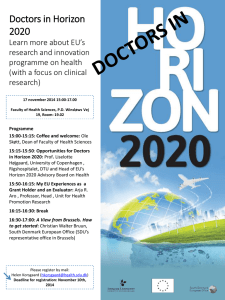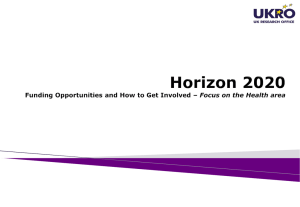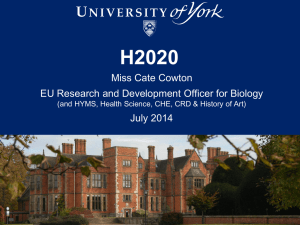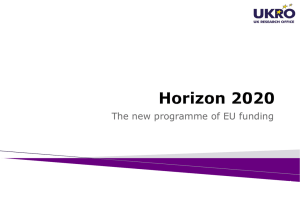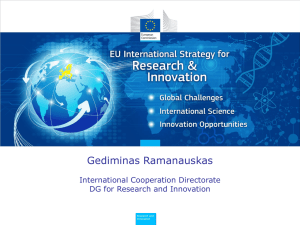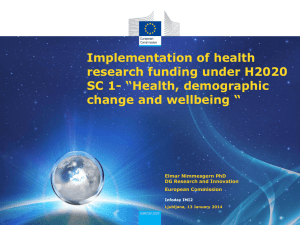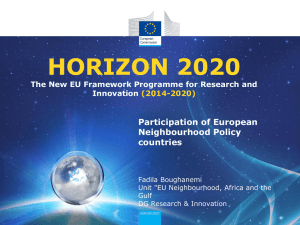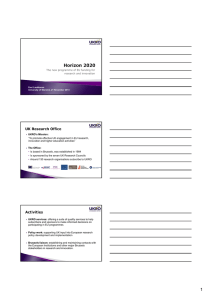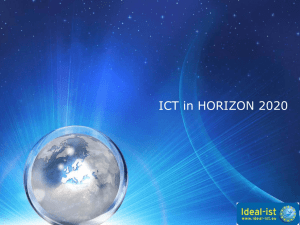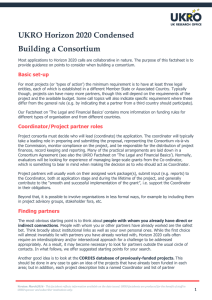Here - University of Aberdeen
advertisement
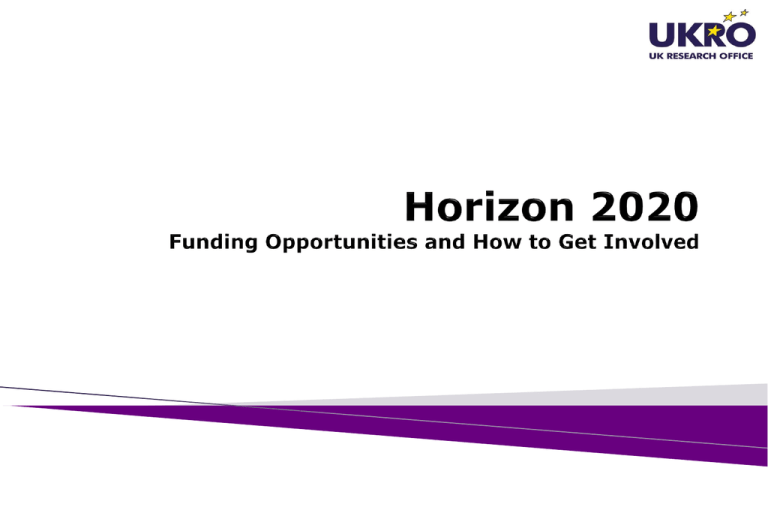
Aberdeen University 14 November 2013 Edward Ricketts edward.ricketts@bbsrc.ac.uk UKRO’s Mission: “To promote effective UK engagement in EU research, innovation and higher education activities” The Office: • Is based in Brussels, was established in 1984 • Is sponsored by the seven UK Research Councils • Around 130 research organisations subscribe to UKRO UKRO Portal: tailored news articles and clear and accessible web pages on the latest in EU funding Enquiry service: individual support through your dedicated European Advisor Annual briefing visits: bespoke training for your institution Meeting room: a venue in Brussels UKRO training and development programme: complementing annual visits UKRO Annual Conference: a key event for EU policy and networking UK National Contact Point: for the Marie Curie Actions and the European Research Council European RTD Insight: Free monthly publication funded by the British Council The EU funding programme for research and innovation from 2014 to 2020 • Budget of €70.2 billion • From research to innovation – from basic research to bringing ideas to the market • Focus on societal challenges EU society is facing (e.g. health, clean energy, food security, integrated transport) • Promise of simplified access for all As at July 2013: • UK-based organisations have been awarded €5.2 billion of FP7 funding, (the second highest share by country, after Germany), equivalent to 15% of the programme’s overall budget • Academic organisations were awarded 62% of this share (thus 10.9% of the entire FP7 budget went to UK academia), and around 17% to SMEs • UK organisations were involved in around 8100 funded projects (the highest number by country) • The highest number of European Research Council grants went to the UK, with around 800 grants based at over 75 different host institutions FP7 Framework Programme Research themes SME participation important Growing importance of innovation Range of funding rates, complex rules Horizon 2020 Integrates FP, EIT, CIP Societal Challenges Strong industry focus overall Covering the entire cycle from basic idea to market Single reimbursement rate for all Excellent Science Industrial Leadership Societal Challenges Health and Wellbeing European Research Council (ERC) Future and Emerging Technologies (FET) Leadership in Enabling and Industrial Technologies (LEIT) ICT, KETs, Space Food security Transport Energy Marie Skłodowska-Curie Actions (MSCA) Climate action Access to Risk Finance Research Infrastructures Societies Security Innovation in SMEs Widening Participation; Science with and for Society European Institute of Innovation and Technology (EIT) EURATOM Joint Research Centre (JRC) Challenge-based, aims to allow freedom to come up with innovative solutions Fewer topics but broader, less prescriptive topics Cross-cutting issues embedded (e.g. social sciences, gender, INCO) Simplified presentation (“common look and feel”) Aim to be relevant to wider range of participants and to provide easy access to newcomers 28 EU Member States (Croatia joined in 2013) Associate Countries (similar list to FP7 expected) • Still under negotiation • Some might not sign agreement in time for Horizon 2020 start but can still apply as long as the agreement is signed in time for grant signature. Third countries (funding will depend on GDP) • BRIC no longer eligible for automatic funding Pillar 1 – Excellent Science The ERC seeks to fund the best ‘frontier research’ proposals submitted by excellent researchers in the area of their choice. Will fund projects led by a Principal Investigator, if necessary supported by a research team (no requirement for collaboration or forming consortia across different EU countries). 25 panels in 3 domains which proposals can be submitted to: Physical Sciences and Engineering (PE) Life Sciences (LS) Social Sciences and Humanities (SH) Starting Grants (for PIs 2-7 years since PhD, up to €2 million for 5 years) Consolidator Grants Advanced Grants Synergy Grants (for PIs 7-12 years since PhD, up to €2.75 million for 5 years) (for leading researchers, up to €3.5 million for 5 years) (for 2 to 4 PIs, up to €15 million for 6 years) Proof of Concept (for ERC grant holders only, up to €150,000 for 1 year) Starting Grants Who is a competitive candidate? Must be able to show potential for excellence and evidence of maturity: • expectation for at least one important publication without the participation of the PhD supervisor • promising track record of early achievements appropriate to field and career stage, including: • significant publications (as main author) in major international peer-reviewed journals • and/or monographs • invited presentations, granted patents, awards, prizes etc • good leadership potential and must convince the ERC panel that the PI will be able to lead an ambitious ‘frontier research’ project Proposals evaluated solely on the basis of excellence (excellence of the PI and of the research project), and should address: Extended Synopsis (5 pages) Scientific Proposal (15 pages) • • • • To what extent does the proposed research address important challenges? To what extent are the objectives ambitious and beyond the state of the art? How much is the proposed research high risk/high gain? To what extent is the outlined scientific approach feasible? • To what extent is the proposed research methodology appropriate to achieve the goals of the project? To what extent does the proposal involve developing novel methodology? To what extent are the proposed timescales and resources necessary and properly justified? • • * please note that this is the wording from the 2013 ERC calls Starting Grants: opens 11 December 2013, deadline 25 March 2014 Consolidator Grants: opens 11 December 2013, deadline 20 May 2014 Advanced Grants: opens 17 June 2014, deadline 21 October 2014 Synergy Grants: no call launched in 2014 Proof of Concept: opens 11 December 2013, two deadlines on 1 April and 1 October 2014 Marie Skłodowska-Curie Actions Operates in a ‘bottom-up’ basis, open to all research and innovation areas Mobility is a key requirement Key areas supported: • • • • Fostering new skills by means of excellent initial training of researchers Nurturing excellence by means of cross-border and cross-sector mobility Stimulating innovation by means of cross-fertilisation of knowledge Co-funding of activities FP7 ITN Horizon 2020 ITN Innovative Training Networks (Early Stage Researchers) IEF IOF IIF IF Individual Fellowships (Experienced Researchers) CIG IAPP IRSES COFUND RISE COFUND Research and Innovation Staff Exchange (Exchange of Staff) Cofunding or regional, national and international programmes Major differences compared to FP7 • Participants defined as ‘academic’ and ‘non-academic’ • Early stage researchers (ESRs) only • The Innovative Doctoral Programme strand moved to the COFUND scheme The ITN scheme consists of 3 strands European Training Networks (minimum of 3 participants) European Joint Doctorates (at least 3 academic participants who can deliver a doctoral degree) European Industrial Doctorates (1 academic participant and 1 nonacademic participant) European and Reintegration Fellowships •12-24 months Global Fellowships •From any country to MS/AC •12-24 months plus 12 month return phase •Host country is subject to the MSCA mobility rule •Secondment from MS/AC to third country •(Reintegration Fellowship only) mobility to Europe, researcher must have been a long-term resident (at least 3 years) in Europe •Mandatory 12 month return phase in Europe (not subject to mobility rule) •(European Fellowship only) separate multi-disciplinary career break panel Mobility rule for the career re-start panel “researchers shall not have resided or carried out their main activity in the country of their host organisation for more than 3 years in the 5 years immediately prior to the relevant deadline” Call Opens Closes Budget ITN 2014 11 Dec 2013 8 April 2014 350 M IF 2014 11 Dec 2013 10 April 2014 175 M NIGHT 2014 11 Dec 2013 4 March 2014 7.8 M COFUND 2014 8 July 2014 18 Nov 2014 80 M ITN 2015 2 Sep 2014 21 Jan 2015 386 M RISE 2015 30 Sep 2014 15 Jan 2015 80 M IF 2015 11 Dec 2014 14 April 2015 190 M Expanded from ICT and Energy to be used as cross-cutting funding scheme Supports frontier research: alternative ideas, concepts or paradigms of risky or non-conventional nature Open, light and agile FET Open •‘Fostering novel ideas’ •Individual research projects •Early ideas •Coordination and support activities Roadmap based research FET Proactive •‘Nurturing emerging themes and communities’ •Open research clusters •2 topics: Global Systems Science (GSS); Knowing, doing being: cognition beyond problem solving High-Performance Computing (HPC) Strategy Developing the next generation towards exascale 3 call topics FET Flagships •‘Tackling grand Interdisciplinary science and technology challenges’ •Common research agendas •Graphene •Human Brain •Support to Flagships Pillar 2 – Industrial Leadership Collaborative projects similar to NMP theme under FP7 • • • • Multi-disciplinary approach Pre-commercial / pre-competitive stage funding Focus on tackling common technological barriers Expectation of strong SME involvement Public Private Partnerships: PPP • • • • • 50% of LEIT budget Leading role for industry in defining research priorities Cross reference to KET focus areas ICT strongly featured SME targeted / demo projects Strong focus on industrial involvement and applied research Developing industrial capacity in focus areas: • Key Enabling Technologies (KETs) Micro- and nano-electronics Photonics Nanotechnologies Advanced Materials Biotechnology Advanced Manufacturing and Processing Nanotechnology and Advanced materials • Bridging the gap between nanotechnology research and market • Nanotechnology and advanced materials for more effective Healthcare • Nanotechnology and advanced materials for low carbon energy technologies and energy efficiency • Cross-sector potential of Nanotechnology and Advanced Materials to drive competitiveness and sustainability • Safety of nanotechnology-based applications and support for the development of regulation • Addressing generic needs in support of governance, standards, models and structuring in nanotechnology, advanced materials and production NB: Based on draft. Subject to change New generation of components and systems Content technologies and information management Advanced Computing Future Internet Robotics Micro- and nano-electronic technologies/ Photonics Cross-cutting and horizontal activities and International Co-operation See draft 2014 Work Programme at: http://www.ukro.ac.uk/subscriber/Pages/131107_draft_ict_wp_public.aspx Future Internet Public Private Partnership Excellent Science ICT in bottom up schemes: ERC, MSCA, FET, and eInfrastructures Industrial Leadership Societal Challenges ICT in LEIT – micronano-electronics KET and photonics KET ICT embedded in Societal Challenges Health: e-health, self management of health, improved diagnostics, improved surveillance, health data collection, active ageing, assisted living; • “Advancing active and healthy ageing with ICT: Service robotics within assisted living environments” • “Advancing active and healthy ageing with ICT: early risk detection and intervention” • “Advanced ICT systems and services for integrated care” • “self-management of health and disease: decisional support systems and patient empowerment supported by ICT Food: • Ocean observation technologies “Acoustic and imaging technologies” • “Forecasting and anticipating effects of climate change on fisheries and aquaculture” • “Improved data and management models for sustainable forestry” Energy: smart cities; energy efficient buildings; smart electricity grids; smart metering; • “New ICT based solutions for energy efficiency” • “Modelling and analysing the energy system, its transformation and impacts Transport: smart transport equipment, infrastructures and services; innovative transport management systems; safety aspects • “Intelligent infrastructure” • “Connectivity and information sharing for intelligent mobility” • “System modelling and life-cycle cost optimisation for waterborne assets Climate: ICT for increased resource efficiency; earth observation and monitoring • “Integrated approaches to water and climate change” • “Harnessing EU water research and innovation results for industry, policy makers and citizens” • “Making Earth Observation Data usable for ecosystem modelling and services” Replaces Research for Benefit of SMEs scheme Dedicated SME instrument Target highly innovative SMEs looking to develop and grow in international environment Funding awarded to single company, but projects can be collaborative Allows for outsourcing of research Three-stage support through innovation cycle One project can access all three in order One application per year Stage 1: Feasibility • 6 month project • ~ €50k lump sum funding • to assess technological / commercial potential of project Stage 2: Innovation Activity • 12 – 24 month duration • €1m - €3m funding • Emphasis on demonstration and market replication Stage 3: Commercialisation phase • No direct funding • Simplified access to debt and equity financial instruments • Assistance with IPR protection Pillar 3 – Societal Challenges Concerns of citizens and society + EU policy objectives Breakthrough solutions come from multi-disciplinary collaborations, including social sciences and humanities Addressing challenges requires full research & innovation cycle, from research to market Focus on policy priorities without predetermining technologies or types of solutions to be developed Personalising health and care Sustainable food security Blue growth Smart cities and communities Competitive low-carbon energy Energy efficiency Mobility for growth Waste Water innovation Overcoming the crisis Disaster resilience Digital security Health Personalising Health and Care Food security Sustainable Food Security, Blue Growth, Innovative, Sustainable and Inclusive Bioeconomy Energy Energy Efficiency, Low Carbon Energy, Smart Cities and Communities Sept Transport Mobility for Growth, Smart Cities and Communities, Blue Growth June Climate Action Waste, Water Innovation, Disaster Resilience Societies Overcoming the Crisis, Smart Cities and Communities Security Digital Security, Disaster Resilience Dec 2014-2015 Calls divided into 8 specific activity areas: • Understanding health, aging and diseases • Effective health promotion, diseases prevention, preparedness and screening • Improving diagnosis • Innovative treatments and technologies • Advancing active and healthy aging • Integrated, sustainable, citizen-centred care • Improving health information, data exploitation and providing an evidence base for health policies and regulation • Co-ordination activities e.g. AHA EIP; More years, Better Lives; Global Alliance for Chronic Diseases The Leadership in Industrial and Enabling Technologies Societal Challenge 2 Societal Challenge -6 Societal Challenge 7 1. Scale-up of nanomedicine production 2. Networking of SMEs in the nanobiomedical sector 3. Biomaterials for the treatment of diabetes mellitus 4. Nanomedicine therapy for cancer 5. Biomaterials for treatment and prevention of Alzheimer’s diseases 1. Assessing the health risks of combined human exposure to multiple foodrelated toxic substances 2. Improving the control of infectious epidemics and foodborne outbreaks through rapid identification of pathogens 3. Tackling malnutrition in the elderly 1. Always more inequalities? New views on equality, solidarity and democracy 2. Early job insecurity and labour market exclusion 3. Youth mobility: opportunities, impacts, policies 4. Inclusive and sustainable urban planning for a modern society 1. Feasibility study for strengthening capacity-building and security protection in case of large-scale pandemics 2. Crises and disaster resilience – operationalizing resilience concepts Innovative Medicines Initiative homepage http://www.imi.europa.eu/ European and Developing Countries Clinical Trials Partnership homepage - http://www.edctp.org/ More Years Better Lives homepage - http://www.jpdemographic.eu/ Joint Programme on Neurodegenerative Disease homepage http://www.jp-demographic.eu/ Joint Programme on Antimicrobial Resistance homepage http://www.jpiamr.eu/ 2014-2015 Calls divided into 3 specific activity areas: 1. Sustainable food security • Sustainable food production systems • Safe food and sustainable consumption • Global drivers of food security 2. Blue Growth: Unlocking the potential of the Oceans • Sustainably exploiting the diversity of marine life • New offshore challenges • Ocean observation technologies/systems • Horizontal aspects, socio-economic sciences, innovation, engagement with society and ocean governance 3. Innovative, sustainable and inclusive bioeconomy • Sustainable agriculture and forestry • Sustainable and competitive bio-based industries • Cross-cutting actions covering all activities + Contributions to other focus areas: Waste Useful links: European Commission pages on EU-funded research on the bioeconomy, plus details of new EU Bioeconomy Strategy: http://ec.europa.eu/research/bioeconomy/policy/ European Commission pages on EU ‘Blue Growth’ strategy: http://ec.europa.eu/maritimeaffairs/policy/blue_growth/index_en.htm European Innovation Partnership on Agriculture: http://ec.europa.eu/agriculture/eip/ Joint Programming Initiative on Agriculture, Food Security and Climate Change (UK among the participating countries): http://www.faccejpi.com/ 2014-2015 Calls divided into 3 specific activity areas: 1. Energy efficiency Bring to mass market technologies and services for a smart and efficient energy use Unlock the potential of efficient and renewable heating-cooling systems Foster uptake of energy efficiency technologies in industry Innovative finance for sustainable energy 2. Low-cost, low-carbon energy Accelerating the development of transformative energy technologies Renewable electricity and heating/cooling Modernising the single European electricity grid Enhanced energy storage technologies Sustainable biofuels and alternative fuels for transport Sustainable use of fossil fuels Social, environmental and economic aspects of the energy system 3. Smart Cities and Communities Commercial-scale solutions with a high market potential, integrating energy, transport and ICT sectors Projects implementing the main aims of the European Strategic Energy Technology (SET) Plan will be a big priority!!! Aviation Draft Work Programme 2014-15 Rail Mode of transport Road 1) Mobility for Growth Waterborne 2) Green vehicles 3) Blue growth 4) Small Business Urban mobility Transport integration Logistics Intelligent transport systems Infrastructures European Commission’s Transport website http://ec.europa.eu/research/transport/index_en.htm Transport Research & Innovation Portal http://www.transport-research.info/web/index.cfm The European Green Cars Initiative website http://www.green-cars-initiative.eu/public/ Clean Sky website http://www.cleansky.eu/ 2011 Transport White Paper - Roadmap to a Single European Transport Area http://ec.europa.eu/transport/themes/strategies/2011_white_paper_en.htm 2012 Transport Communication – Research and Innovation for Europe’s Future Mobility http://eur-lex.europa.eu/LexUriServ/LexUriServ.do?uri=COM:2012:0501:FIN:EN:PDF Flightpath 2050 – Europe’s Vision for Aviation (2011) http://ec.europa.eu/transport/modes/air/doc/flightpath2050.pdf Fighting and adapting to climate change Protecting the environment, sustainably managing natural resources and ecosystems Sustainable supply of nonenergy and nonagricultural raw materials To achieve: Transition to a green economy through eco-innovation + Global environmental observation and information systems Contributing to focus areas Waste: a resource to recycle, reuse and recover raw materials Water innovation: boosting its value for Europe 1. Waste: A resource to recycle, reuse and recover raw materials • Addressing whole production and consumption cycle – waste prevention, design of processes and products for recyclability, reuse, waste management 2. Water innovation: Boosting its value for Europe • Integrated approaches to water and climate change • Bringing innovative water solutions to the market 3. Fighting and adapting to climate change • Better understanding of climate change and reliable projections • Innovative adaption and risk prevention measures • Climate change mitigation policies 4. Sustainably managing natural resources and ecosystems • Functioning of ecosystems, interactions with social systems and their role in sustaining economy and human beings • Support for decision making and public engagement European Commission pages on EU-funded Environmental research http://ec.europa.eu/research/environment/index_en.cfm European Innovation Partnership on water: • http://ec.europa.eu/environment/water/innovationpartnership/index_en.htm Joint programming initiatives: • Water: http://www.waterjpi.eu/home • Oceans: http://www.jpi-oceans.eu/home • Climate: http://www.jpi-climate.eu/home Life+ programme: • http://ec.europa.eu/environment/life/funding/lifeplus.htm Overcoming the crisis: new ideas, strategies and governance structures Young generation in an innovative, inclusive and sustainable Europe Reflective societies: cultural heritage and European identities To achieve: inclusive and innovative European societies in a context of unprecedented transformations and growing global interdependencies Europe as a global actor New forms of innovation 1. Overcoming the crisis: new ideas, strategies and governance structures for Europe • The reform of the EU economic governance structure to better secure financial and economic stability • The social, political and cultural consequences of and responses to the crisis • Understanding the evolution of the crisis • The impacts of broader global trends on the EU’s economy 2. Young generation in an innovative, inclusive and sustainable Europe • The situation of young people, their capabilities, prospects and needs – from the economic, social and individual perspective • How to ensure the full participation of young people in an innovative, inclusive and sustainable Europe? 3. Reflective societies: cultural heritage and European identities • European diversities, cultural heritage and identity formation - ‘Unity in diversity’ • Intellectual, artistic and historical legacy of the EU • Digital technologies for European cultural heritage 4. Europe as a global actor • International cooperation in research and innovation • Research to support Europe’s role as a global actor 5. New forms of innovation • Social and public sector innovation, new business models • Modernisation of public administration, incl. ICT-enabled open government • Uptake of technologies in education, training and inclusion “Social sciences and humanities (SSH) research will be fully integrated into each of the general objectives of Horizon 2020” Excellent Science Base • SSH fully supported under the ERC, MCSA and research infrastructures • FET calls for “intense collaboration across disciplines…cognitive sciences, social sciences or economics…and with the arts and humanities” • “Societal engagement on responsible nanotechnology” Industrial Leadership • “Innovative materials for creative industries” • “Developing smart factories that are attractive to workers” • “Human-centric digital age” “SSH will be mainstreamed as an essential element of the activities needed to tackle each of the societal challenges” Health Food security • “Individual empowerment for selfmanagement of health” • “A systems approach for the reduction, recycling and reuse of food waste” • “Promoting integrated care” • “Optimising the efficiency and effectiveness of health care systems and reducing inequalities” • “Unlocking the growth potential of rural areas through enhanced governance and social innovation” • “Tackling malnutrition in the elderly” Energy • “Socio-economic research on energy efficiency” • “The human factor in the energy system” • “Consumer engagement for sustainable energy” How to get involved Publication of work programmes and calls for proposals: • The first work programmes will cover 2014 and 2015 • The first calls are expected to be launched in December Work programmes explain what is funded (topics, grant schemes) and the expected policy impact Calls for proposals give details on the timeline (deadline, evaluation, results) and the eligibility criteria For researchers: Check the Horizon 2020 draft work programmes - do they cover your research area? Activate your current networks – do you need to expand them? Who are the key players? Who has been involved in previous projects? Check FP7 Projects http://cordis.europa.eu/fp7/projects_en.html Attend EC information days, events & conferences Join the EU evaluators database (http://ec.europa.eu/research/participants/portal/page/experts) Check out partner searches: UKRO can distribute partner profiles / National Contact Points (NCPs) / IDEAL-IST (ICT research), Fit for Health (Health research), NET4SOCIETY (SSH research) / Enterprise Europe Network / Social Media? (Linked-in etc) / IGLO partner search (Informal Group of European RTD liaison offices) Some areas, such as Marie Curie, ERC and FET Open are bottom-up Sign up to the UKRO portal and you will receive: Updates on the likely funding priorities for Horizon 2020 in each planned area Updates on key events Updates on call dates and management/financial issues Updates on opportunities to feed in to the programme’s development (i.e. formation of expert advisory groups, evaluator registration, other calls for expressions of interest) ‘UKRO understands’: early information New: UKRO Horizon 2020 Factsheets! Practical aspects of Horizon 2020 Single funding rate per project: • 100% for research projects • 70% for innovation projects (100% for non-profit organisations including universities) • Rate and type of project defined in the Work Programme Indirect costs: flat rate of 25% Research and Innovations Actions Innovation Actions CSA: Coordination and Support Action SME Instrument cPPP: contractual Public/Private partnership ERA-NET Prizes PCP: Pre-contractual procurement PPI: Public procurement of innovative solutions “Traditional” multi-national, multi-partner collaborative projects 100% Closer to market ” multi-national, multipartner “innovation projects” 70% “Traditional” multi-national, multi-partner support actions 100% (or 70%) SMEs only – research can be subcontracted to HEIs Vehicle to pursue specific technological roadmap. Part funded by industry. EU funding element from Horizon 2020. Issue research calls – same funding regime as Horizon 2020 Research programmes run by network of national funders in specific field part funded by EU from Horizon 2020. Issue research calls on their own funding regimes All or nothing specific competitive calls – content varies Procurements carried out by procurers in MS/AC or by the EU Procurements carried out by procurers in MS/AC or by the EU No time sheets for staff working full-time on Horizon 2020 projects Shorter time to grant (5+3 months) Promise of broader acceptance of participants’ accounting practices Promise of risk and fraud prevention based audit strategy One audit certificate (Certificate on the Financial Statements) at the end of each project per beneficiary New features to include: • Simpler and more user-friendly presentation of calls • Improved search function (including keywords) for specific calls and topics • ‘Context-related’ presentation of call documents Improved grant management facilities: • No further paper submissions of documents • Improved ‘My Projects’ section featuring new project dashboard, clearer notifications of tasks and better access to grant documents • EC Project Officer details to be indicated next to each project • More flexibility for organisations to determine access rights and signatories ☓ Calls SEARCH TOPICS FUNDING GUIDE Horizon 2020 COSME Search keywords: climate change Search Search Topics Call Updates Other Funding Opportunities Previous Framework Programmes (FP7 & CIP) Horizon 2020 predefined criteria: Cross-cutting Key-Enabling Technologies (KETs) International cooperation ERA-NET SME Instrument Gender Socio-economic science and Humanities 3 results Filter options: ◎ Open calls ○ Closed calls ○ Forthcoming calls Sort by: ○Publication date ◎Deadline ○Title ○Call ID Topic: SFS 7 - 2014: Optimising external nutrient inputs in intensive crop production systems in Europe European crop production is facing more and more difficulties in remaining competitive in the global market for many reasons. One of these reasons is certainly the high cost of external nutrient inputs necessary More… Call title: Sustainable Food Security Call identifier: H2020-SFS-2014/2015 Status: Open Deadline: 2014-03-18 Topic: WATER 2 – 2014/2015: Integrated approaches to water and climate change The rising demands of a growing world population for food, water, materials and energy will put increasing pressures on land use, water resources and ecosystems. Energy consumption is expected to increase, More… Call title: Water Innovation: Boosting its value for Europe Call identifier: H2020-WATER-2014/2015 Status: Open Deadline: 2014-03-18 Topic: WATER 5 – 2014/2015: Strengthening international R&I cooperation in the field of water Stay informed RSS feed iCal Email notification Developing countries, especially in Africa, are facing serious challenges for sustaining its development. Sustainable water supply and sanitation is fundamental to the food security, health, survival More… Call title: Water Innovation: Boosting its value for Europe Call identifier: H2020-WATER-2014/2015 Status: Open Deadline: 2014-03-18 ☓ Calls HORIZON 2020 CALLS FUNDING GUIDE Horizon 2020 COSME Call: Water innovation: boosting its value for Europe WATER 1 – 2014/2015 Search Topics Topic: Bridging the gap from innovative water Call Updates solutions Topic Descriptionto marketTopic replication Conditions Call Documents Submission Service Other Funding Opportunities Specific challenge: One of the main factors hampering the market uptake of innovative solutions in the field of water Previous Framework Programmes (FP7 & CIP) is the lack of real scale demonstration of their long term viability. In addition, highly promising and advanced ecoinnovative water technologies, processes, products and services often do not reach the market due to precommercialisation challenges and the residual risk linked to scaling-up. The first Strategic Implementation Plan of the European Innovation Partnership (EIP) on Water has identified as priority areas: water reuse and recycling; water and wastewater treatment, including recovery of resources; water and energy integration; flood and drought risk management; and the role of ecosystem services in the provision of water related services. Scope: Actions should address one or more of the following: • demonstration/pilot activities of new or improved innovative water solutions (technologies, processes, products and/or services) in a real environment • the first application and market replication of near commercial water solutions. They should focus on the priorities identified in the first Strategic Implementation Plan of the European Innovation Partnership (EIP) on Water, and/or helping process industries become less water dependant while ensuring efficient management of other resources (e.g. raw materials and energy), and/or exploiting untapped potential of ICT by developing and deploying advanced ICT solutions for water resources management in agriculture and urban areas. Expected impact: Wide and fast deployment of eco-innovation in the water sector in line with the priority areas of the Stay informed RSS feed iCal Email notification EIP 'Water'. Support to the objectives of the Sustainable Process Industries Public-private Partnership (SPIRE PPP), in particular helping process industries to view water as a highly valuable asset rather than a consumable. Market penetration, long-term application and sustained use of successful solutions by various end-users, and creation of new market opportunities both inside and outside Europe. Increased resource efficiency and environmental performance of the water sector, through synergies between public water authorities, water utilities, various economic sectors, big companies, SMEs and research organisations. Type of action: Innovation actions (70%) Any questions?
